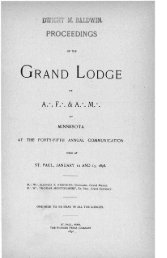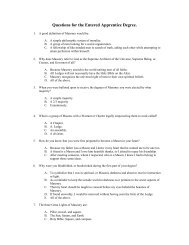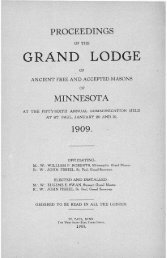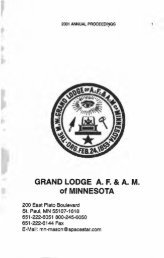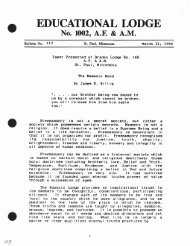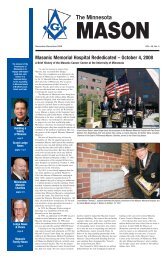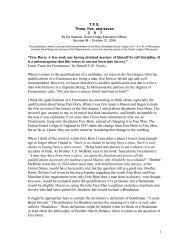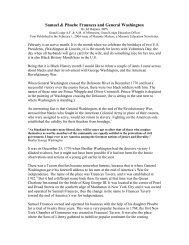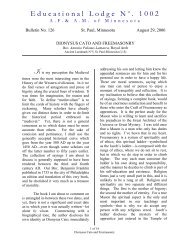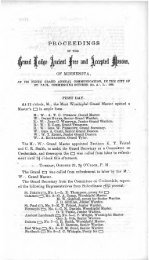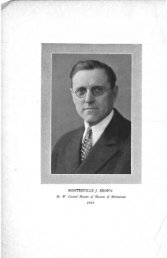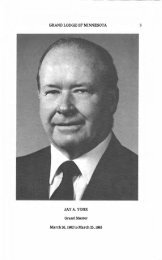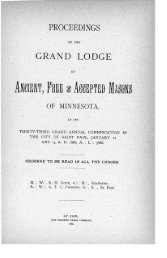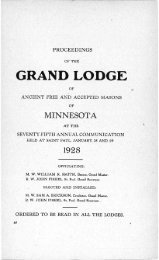T.F.S. #128 - The Grand Lodge of Minnesota
T.F.S. #128 - The Grand Lodge of Minnesota
T.F.S. #128 - The Grand Lodge of Minnesota
You also want an ePaper? Increase the reach of your titles
YUMPU automatically turns print PDFs into web optimized ePapers that Google loves.
T.F.S.<br />
Three, five, and seven<br />
3 5 7<br />
By Ed Halpaus, <strong>Grand</strong> <strong>Lodge</strong> Education Officer.<br />
Number 128 – August 01, 2008<br />
This publication, while it is printed with the permission <strong>of</strong> the Most Worshipful <strong>Grand</strong> <strong>Lodge</strong> <strong>of</strong> A.F. & A.<br />
M. <strong>of</strong> <strong>Minnesota</strong>, contains the writings and opinions <strong>of</strong> Ed Halpaus and is not in any way the opinion <strong>of</strong><br />
the <strong>Grand</strong> <strong>Lodge</strong> <strong>of</strong> <strong>Minnesota</strong>.<br />
“Ethics and equity and the principles <strong>of</strong> justice do not change with the calendar.” D.<br />
H. Lawrence<br />
Deontology<br />
This past spring the Midwest conference on Masonic Education met in Omaha, Nebraska. It was<br />
an exceptional conference, and everyone who was at the conference was glad he took the time to<br />
attend.<br />
One <strong>of</strong> the workshops at the conference, “Virtue Ethics,” was conducted by Brother and Dr. Nelson<br />
Stone. This workshop was all too short, (just 30 minutes,) but then this is one <strong>of</strong> my favorite<br />
subjects, Brother Stone had a very difficult task to delve into ethics and philosophy as they can be<br />
applied to Masonry in so short a time, but he was able to do it, and he made it extremely<br />
interesting. Delving into ethics and philosophy and how they apply to Freemasonry is a very<br />
worthwhile thing to do. I like these subjects not because I am so well versed in it, but because I<br />
want to understand it better.[i] <br />
Virtue Ethics is a peculiar kind <strong>of</strong> ethics in that it tells you things like ‘be a good person’ or ‘maintain<br />
relationships and are for other people’ without providing a clear idea <strong>of</strong> how to do it.[ii] “”<br />
This is a problem that philosophers refer to as ‘contextualism.’ Virtue ethics does not make<br />
universal claims. E.g.[iii] the ethics <strong>of</strong> the right thing to do varies from context to context.<br />
When I mention about understanding as it relates to virtue ethics and philosophy and Masonry I<br />
remember something Rabi Benjamin Blech says in one <strong>of</strong> his lectures about the people receiving<br />
the Torah from God; he says their response was “We will do and we will hear.” Meaning that they<br />
first committed to do first and then to begin to understand. Remembering that reminds me <strong>of</strong> the<br />
ritual <strong>of</strong> Freemasonry; the candidate in the degree is told that in order to join in the great and good<br />
work <strong>of</strong> Freemasonry it is necessary for him to make a statement and promises <strong>of</strong> future actions, as<br />
all Masons before him have also done, before he begins to understand; every Freemason has<br />
been willing to do that; Masonry is a fraternity <strong>of</strong> action: After the action <strong>of</strong> our promises we then<br />
begin our journey <strong>of</strong> understanding.<br />
One <strong>of</strong> the topics mentioned in the workshop on Virtue Ethics was Deontology, which is different<br />
than virtue ethics: [Deon-tology] this is the theory <strong>of</strong> moral obligation or commitment, which applies<br />
very well to the obligations <strong>of</strong> the degrees in Freemasonry. If you were to study deontology much<br />
<strong>of</strong> what you will learn will have a special significance to you as a Freemason. <strong>The</strong> word ‘deontology<br />
’ comes from the Greek word ‘Deont,’ which means that which is binding or needful. <strong>The</strong> word is<br />
also influenced by the words ‘Dien,’ and ‘Logy;’ ‘Dien’- bind; ‘Logy’ – discourse or expression.<br />
Deontology is about duty. <strong>The</strong> term ‘deontological’ means ‘duty based.’ Any moral theory that is<br />
deontological is one that focuses on duty; it doesn’t matter who or what that duty is to, so it applies<br />
very well to Masons being duty bound to fulfill their promises no matter who they are made to,<br />
even to themselves. <strong>The</strong> Philosopher Emmanuel Kant is one who was a proponent <strong>of</strong>
deontological theories. According to Kant deontology was all about following absolute rules; to do<br />
one’s duty. A definition <strong>of</strong> duty is; something you are required to do whether you want to or not.[iv]<br />
<br />
Following rules is an interesting subject in itself, which you may want to study. In the obligation <strong>of</strong><br />
the Masonic degrees there are things a Mason promises to do, and not to do. Rabi Benjamin<br />
Blech[v] says in referring to the many Mitzvot in the Torah that the don’ts are more<br />
important than the do’s: he explains that the ‘don’ts’ prevent us from making grievous errors, while<br />
the do’s guide us down a proper path <strong>of</strong> conduct. <strong>The</strong> Masonic obligations also contain various do’<br />
s and don’ts. For our own enjoyment each <strong>of</strong> us might enjoy reviewing the obligations, and<br />
maybe the charges, <strong>of</strong> the three degrees <strong>of</strong> the Blue <strong>Lodge</strong>, just to refresh our memories about<br />
the do’s and don’ts <strong>of</strong> Freemasonry.<br />
When we think <strong>of</strong> deontological theory we might also want to learn about ‘motivist’ and ‘<br />
consequence’ theories: To explain briefly the ‘motivist ethical theory’ says that the rightness or<br />
wrongness <strong>of</strong> an action depends, in its entirety, on the motive from which the action was done. e.g.<br />
why was the action taken? <strong>The</strong> ‘consequence ethical theory’ says the rightness or wrongness <strong>of</strong> an<br />
action depends entirely on the effects that the action has; e.g. what are the results <strong>of</strong> the action?[vi]<br />
<br />
Philosophers who hold to the deontological ethical theory say that it differs from the motivist and<br />
the consequence theories in that “the rightness or wrongness <strong>of</strong> an act depends neither on the<br />
motive from which an act was done nor upon the consequences <strong>of</strong> the act – but solely upon what<br />
kind <strong>of</strong> act it was.” Because <strong>of</strong> the stress on obligation and duty deontological theories are also<br />
called ‘Duty Ethics.’<br />
Philosopher Emanuel Kant’s ideas on deontological ethics and morality have been summed up to<br />
just a few simple items which include; always tell the truth, and always keep your promises. “Kant<br />
also believed that the only thing that is totally and completely good without exception is a good<br />
will.” What Kant meant by ‘good will’ was that our desires, the things we wish and hope for, must<br />
be good.[vii] He believed that only the ‘good will’ is absolutely good, thus “just<br />
because a wrong or evil act might turn out good in the end [I’m sure you can think <strong>of</strong> examples <strong>of</strong><br />
this kind <strong>of</strong> action] doesn’t mean that the act becomes good. “<strong>The</strong> moral <strong>of</strong> this is that you can’t just<br />
look at behaviors or outcomes to see if an act is right or wrong.” Deontology, according to Kant, “<br />
totally rejects out comes as a way <strong>of</strong> judging acts; because things can turn out well even when we<br />
don’t intend them to, and things can turn out terribly, even when we mean well!”[viii] <br />
“A man without ethics is a wild beast loosed upon this world.” Brother Manly Hall<br />
From the Great Light <strong>of</strong> Masonry: “But Abram said to the king <strong>of</strong> Sodom, ‘I have raised my<br />
hand to the Lord, God Most High, Creator <strong>of</strong> heaven and earth, and have taken an oath that I will<br />
accept nothing belonging to you, not even a thread or the thong <strong>of</strong> a sandal, so that you will never<br />
be able to say, ‘I have made Abram rich.’ I will accept nothing but what my men have eaten and<br />
the share that belongs to the men who went with me – to Aner, Eshcol and Mamre. Let them have<br />
their share.” Genesis 14:22-24 NIV<br />
Words to live by: “<strong>The</strong> Ten Commandments aren’t the ten ‘suggestions.’ <strong>The</strong>y are meant to be<br />
binding, whether we agree or not, and in every situation.” Rabbi Benjamin Blech
Please remember: if you would like to participate in the latest Masonic Monday Question, please go to<br />
http://www.lodgebuilder.org and click on the <strong>Lodge</strong> Education forum.<br />
When you have an answer send it to masonicmonday@gmail.com the Masonic Monday Question for the<br />
week <strong>of</strong> 07/28/08 is: “Why do Brethren entering and leaving a <strong>Lodge</strong> salute the Master?”<br />
More Light – Mehr Licht ©, Masonic Matters © and T.F.S. ©, are sent out by Email at no charge to<br />
anyone who would like to receive them. If you enjoy these publications please share them with others.<br />
To subscribe to any one or all <strong>of</strong> these publications just send an E-mail to erhmasonic@gmail.com with<br />
Subscribe in the subject line and you will be added to the list to receive the publications.<br />
To read this paper, (or past issues,) on the web go to: http://www.halpaus.net<br />
and click on the publication you would like to read.<br />
With “Brotherly Love”,<br />
Ed Halpaus<br />
<strong>Grand</strong> <strong>Lodge</strong> Education Officer<br />
“Always two there are, a master and an apprentice.” Yoda<br />
[i] Why study ethics and philosophy and apply them to what we can learn in<br />
Freemasonry? One book [a] says “instead <strong>of</strong> letting philosophers do all the thinking for us –<br />
speculating on what is good and right from their l<strong>of</strong>ty ivory towers – we should be figuring it out for<br />
ourselves.” <strong>The</strong> second portion <strong>of</strong> the paragraph on this subject is very similar to what Masonry<br />
says about interpreting symbols; each <strong>of</strong> us is free to interpret the meaning <strong>of</strong> symbols for<br />
ourselves. This should sound familiar: “But our understanding will be rational only to the degree that<br />
our conversation is truly fair, and everyone has roughly the same opportunities, incentives, and<br />
capacities for informed, reasoned discussion.”<br />
a. <strong>The</strong> Complete Idiot’s guide to Understanding Ethics [0-02-864325-9]<br />
[ii] ibid<br />
[iii] I.e short for Latin id est meaning ‘that is.’ E.g. short for Latin exempli gratia<br />
meaning ‘for example.’<br />
[iv] <strong>The</strong> Complete Idiot’s guide to Understanding Ethics<br />
[v] Understanding Judaism – the basics <strong>of</strong> Deed and Creed<br />
[vi] Philosophy Made Easy [ISBN0-385-42533-3]<br />
[vii] <strong>The</strong> Complete Idiot’s guide to Understanding Ethics<br />
[viii] Ibid



